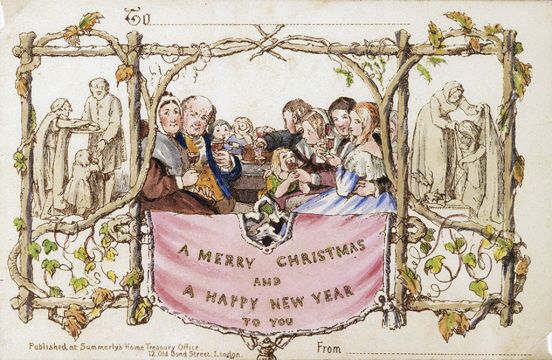The first commercially printed Christmas card is up for sale, showing a merry Victorian-era scene that scandalised some who denounced it when it first appeared in 1843.
The card, being sold online through a consortium run by Marvin Getman, a dealer in rare books and manuscripts based in the US city of Boston, depicts an English family toasting the recipient with glasses of red wine.
“A Merry Christmas and a Happy New Year to You,” it reads.
But for teetotallers — and there were plenty of those in the 19th century — the imagery included a bit too much Christmas cheer – in the foreground, a young girl is pictured taking a sip from an adult’s glass.
That did not sit well at the time with the puritanical Temperance Society, which kicked up such a fuss it took three years before another Christmas card was produced.
“They were quite distressed that in this ‘scandalous’ picture they had children toasting with a glass of wine along with the adults. They had a campaign to censor and suppress it,” said Justin Schiller, founder and president of Battledore, a dealer in antiquarian books who is selling the card.
Mr Getman, whose brokerage had shifted online before the coronavirus pandemic disrupted traditional touring book fairs, said the hand-coloured lithograph is believed to have been a salesman’s sample.
Only 1,000 copies were printed and sold for a shilling apiece, and experts believe fewer than 30 have survived, he said.
The card, intended to double as a greeting for Christmas and New Year’s Day, was designed by painter and illustrator John Callcott Horsley at the suggestion of Sir Henry Cole, a British civil servant and inventor who founded the Victoria & Albert Museum in London.
Cole is widely credited with starting the tradition of sending holiday cards, a multimillion-pound industry today.
It is believed to have gone on sale in the same week in December 1843 that Charles Dickens’ A Christmas Carol was first published.
Christie’s auction house in London is also selling one of the rare cards and says it expects the item to fetch between £5,000 and £8,000.







